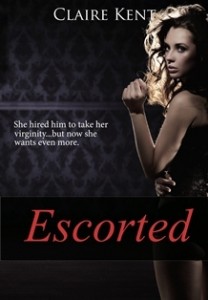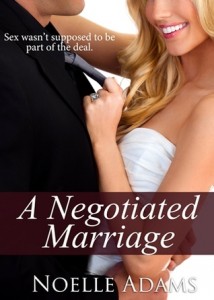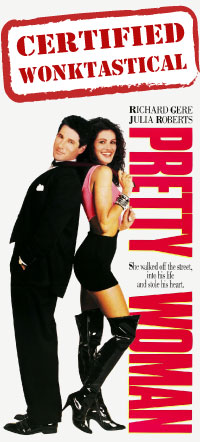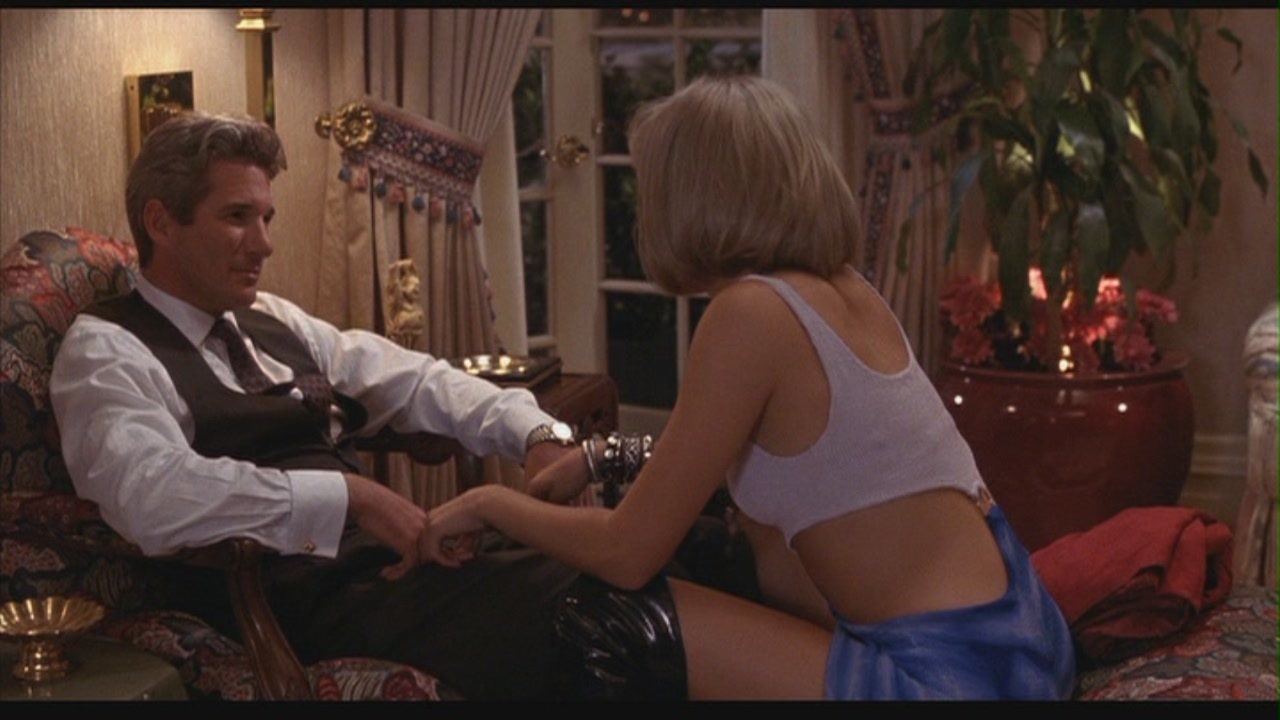 I’m pleased to host Claire Kent this morning on Wonkomance. Claire Kent is the author of Escorted, in which a twenty-six-year-old virgin, Lori, hires a male escort, Ander, to rid her of her unwanted innocence. The self-published book has won many converts (to the tune of more than a thousand ratings on Goodreads).
I’m pleased to host Claire Kent this morning on Wonkomance. Claire Kent is the author of Escorted, in which a twenty-six-year-old virgin, Lori, hires a male escort, Ander, to rid her of her unwanted innocence. The self-published book has won many converts (to the tune of more than a thousand ratings on Goodreads).
The book is delightfully Wonktastical—a bald hero with serious daddy issues, and loads of early, awkward, clinical sex—and it’s one of those deep, interior, emotional reads (a la Charlotte Stein!) that you just can’t put down.
Claire has been writing romance novels since she was twelve years old. She has a PhD in British literature and, when she’s not writing, she teaches English at the university level. She also writes romance novels under the pen name Noelle Adams–the “One Night” series, among others.
(Contest now closed for free copies of Escorted.)
You’re getting quite a bit of buzz with Escorted—seems like maybe you’ve touched a nerve with readers! What do you think it is?
I have no idea! I think maybe it’s the premise that has gotten people to give it a try, but most of the positive reviews say they like the way the relationship developed. That’s very encouraging to me, since the way I develop characters and relationships is also the reason I’ve never been the right “fit” with a publisher.
I’m absolutely shocked that the book has been received so well. I really did throw it up on Amazon on a whim, since I always loved the story but could never do anything with it. I was quite sure it would be a flop.
The hero, Ander, has been bald since he was a teenager and wrestles with significant daddy issues. Tell me a little bit about how this hero was conceived and how readers (including you!) feel about him.
The haunted hero with daddy issues has always been my favorite. I’m not sure why, but the particular kind of tortured soul I like in my heroes nearly always comes from parenting issues of some kind. And I’ve always found bald men crazy-sexy. Seriously, I remember watching The Ten Commandments when I was about thirteen and thinking that Pharaoh was much hotter than Moses! With Ander, I wanted some physical sign of his emotional scars—and I didn’t want to use a literal scar—so the baldness became that sign.
Ander’s baldness has definitely been a negative for a lot of readers, though. Many reviews have said that they couldn’t get past it, which I completely understand.
I love the way the sex builds in this book, from awkward and clinical to deeply sensual and romantic. Were some scenes harder than others to write?
I actually had a great time with the early clinical sex. It was so different from any sexual scenario I’ve written before that I really enjoyed the challenge. I often find sex scenes exhausting to write, so it’s sometimes hard to work up the energy to tackle them. But I had no trouble finding motivation to write those early scenes. I think the hardest sex scene in Escorted was the happy-resolution sex in the end. Since the final love scene is the culmination of the entire book’s development, I always feel this pressure to make the sex feel as special as their love is. It’s really hard to do that without falling into clichés.
We often get told that people never set out to write Wonkomance but find themselves doing it despite themselves … is that you?
I definitely never set out to write Wonkomance! I don’t think I’m particularly high on the wonkiness scale, in general. I love to write billionaire heroes, marriages of convenience, unexpected pregnancies, and all the standard tropes. Ander with his shiny bald head is actually an exception for me—most of my heroes are more traditionally handsome. Although my heroes will always have some unexpected quirk or vulnerability, and they’re almost never the normal alpha. Oh, and I also love to write awkward or unsatisfying sex scenes.
Overall, though, if anything is wonky about me, I’d say it’s that my books don’t meet a lot of established romance genre expectations. Escorted really does a lot of things “wrong,” so much so that publishers would never have taken it on without a major overhaul. It’s all 3rd person limited to the heroine’s POV, there’s not major drama, the conflict and character growth is very subtle (perhaps to the point of obscurity!), and the major moments are understated, except the final resolution. There have been plenty of readers who’ve noticed and not liked the book because of all that, which again I completely understand. None of that is intentional—I just write what seems real to me. So maybe that’s a little wonky.
 Why did you decide to write this book as Claire Kent instead of Noelle Adams?
Why did you decide to write this book as Claire Kent instead of Noelle Adams?
Two reasons. One was that Escorted wasn’t a good fit for my Noelle Adams published titles. It’s much more erotic, for one thing. I was trying to work on a “brand” for my pennames, and I think that was a wise idea. Many readers who love my Noelle Adams stuff weren’t too thrilled with Escorted, and vice versa.
The other reason is that I was sure Escorted would flop. It was mostly an experiment, and I didn’t want to waste too much time on a likely failure, so I didn’t spend nearly the same amount of time editing it as I have my other work. It was all so spur of the moment that I just used Lori’s penname from the book—since I was in a hurry and couldn’t be bothered to think of a different one. Because of all this, I didn’t want Escorted attached to the penname I was actually working on.
What made you decide to pursue self-publishing? What are the pros and cons, as you see them? Have you stumbled into any pitfalls you’d advise people to avoid?
I’ve been pursuing a writing career for more than ten years. I’ve had four different literary agents—all very reputable—and none of them could get me a publishing deal, even when a couple of the acquiring editors wanted to take on my project. I was never the right “fit” for the publishers. I’ve had titles contracted with two different e-first publishers, and with both I’ve had incredibly frustrating and discouraging experiences, primarily because, again, I couldn’t make my writing into the “fit” they wanted (even though I tried!).
Self-publishing was mostly a last-ditch effort to reach readers. I’ve spent years in the past writing nothing at all because I was so discouraged about publishing prospects, and I didn’t want to fall into that again. So I figured I had nothing to lose.
The one benefit of spending so long trying to get published is that I’ve collected a huge stash of finished manuscripts. Now that I’m self-publishing, I have something to do with them all.
And the biggest pitfall that I’ve experienced was assuming no one was going to read my book! I’d advise everyone to act like your book is going to take off and make it as polished as you can!
Tell me a little bit about the trajectory of this book, in terms of generating buzz. What seemingly little events—a review on a certain site, tweets by a particular reviewer, etc—have made the most difference in the book’s success? Any lessons you can generalize for other writers pursuing self-publishing?
I put the book out in mid-December and did almost no promotion. It sold about fifty copies until I put it on the free promotion at Amazon in January. That’s when everything changed. I’ve tried to figure out what works and what doesn’t, but I haven’t been able to make any sense out of why and how things sell. The problem with Escorted is that everything happened at once. During the free promotion period, a lot of people were starting to give it good reviews on Amazon—and also Goodreads, although those were always mixed. Then some (incredibly generous) bloggers started talking about it, but that was happening at virtually the same time as the reader reviews and the free promotion period, so I don’t know what made a distinct difference or if everything just worked together.
I know for sure that the free promotion on Amazon is the tool that has worked the best for me. My Noelle Adams release in January did even better than Escorted in its free promotion period (twice as many downloads). It didn’t get any buzz, but it has actually sold even better afterwards than Escorted. The only thing I can attribute the sales to with that book is the free promotion, since no one has been talking about it at all and I haven’t done any other marketing. But I know other writers have seen virtually no impact from the free promotion, so it’s not a sure-fire thing. I wish I could give better advice to writers pursuing self-publishing, but it’s all still a mystery to me!
Excerpt from Escorted
“Do you want me to keep my clothes on this evening?” Ander stood, dark and looming, beside the bed.
Since she felt braver today, she replied, “Oh. No. I guess not. You can take them off.”
Ander started unbuttoning his shirt. His motion was slow, almost mesmerizing, as he gradually revealed his bare chest beneath. When he’d untucked the skirt, he let it slide with unhurried ease to the floor. His chest was toned and masculine. She could see the clean contours of muscle development on his abdomen and shoulders, even in the dim light of the room.
He slid his belt out of the loops. He moved naturally, not ostentatiously, but Lori suddenly realized he was giving her a little show.
It was effective. As she watched, her intimate muscles clenched in excitement and jitters rose up in her belly, but she also felt a gurgle of amusement. She had to press her lips together to stifle it.
Who would have thought that Lori Addison would be in the position to get such an elegant striptease from a bald man?
She must not have hidden her reaction well because Ander paused in the midst of unzipping. He arched his eyebrows. “Is something wrong?”
“Oh, no,” she said, keeping her eyes wide and trying not to stare down at what would be revealed when his pants came unzipped. “Everything’s fine. You’re doing an excellent job.”
Ander narrowed his eyes, a little suspiciously, before he let his trousers fall to the floor, revealing black silk boxers and a pair of very fine legs.
“Boxers?” Lori asked, working past the surge of visceral admiration at the sight of his near perfect body. “I was wondering what you wore.”
Ander took off his watch as he replied, “I didn’t know what you’d prefer. Since you’re American, I thought boxers were a better bet.”
Lori blinked up at him. “What do you mean?”
“American women tend to prefer boxers on men. If you were international, I’d have worn briefs. Obviously, once I know a woman’s preference, I accommodate it.”
“American women prefer boxers?”
“I have only my own informal assessment to go by, but, yes, I’d say three-fourths of them do. I try to pay attention.”
“Wow,” Lori breathed. “That’s what I call attention to detail.”
Ander gave her a half-smile. “It’s part of my job.” His hands lingered on the waistband of his boxers. “Shall I?”
You can purchase Escorted from Amazon. (Contest now closed for free copies.)



























